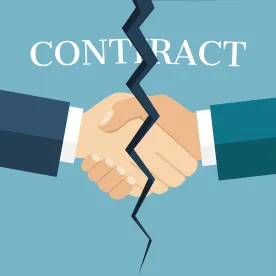On April 22, 2020, in the wake of ongoing fallout from the 2019 novel coronavirus (COVID-19) pandemic, private equity firm Sycamore Partners filed suit seeking court approval to walk away from its deal to purchase a majority stake in Victoria’s Secret. Sycamore’s lawsuit is the highest-profile example yet in the post-COVID-19 world of a buyer seeking to terminate a transaction even after the purchase agreement has been signed.
The lawsuit may not be the last on the topic. In the coming months, as the values of many recent acquisition targets have declined due to the pandemic, the courts will likely see a significant uptick in litigation relating to claims by buyers that the net purchase price of the target should be lowered in closed transactions (via working capital adjustments or indemnification claims) or that the acquisition should not close (at least at the original price) in other transactions. Much of that litigation may involve concepts similar to those at issue in the Victoria’s Secret litigation: material adverse effect (MAE) closing conditions (sometimes also referred to as material adverse change clauses), and pre-closing covenants of the seller to operate the target in the ordinary course of business.
L Brands announced on May 4, 2020, that the transaction was terminated and would not close, it settled its dispute with Sycamore Partners, and neither party would pay termination fees. While we will not be able to see how the merits of the parties’ arguments are resolved in court, the initial filings in the lawsuit offer helpful insights for both buyers and sellers who have yet to close deals—and for those who have already closed—in the midst of the pandemic.
MAE CLOSING CONDITIONS AND ORDINARY COURSE INTERIM OPERATING COVENANTS IN M&A TRANSACTION AGREEMENTS
In acquisitions involving a closing date that is after the date when the definitive agreement is signed, it is typical for there to be conditions to the buyer’s obligations to close the transaction. Two common closing conditions include the absence of a MAE and the seller’s satisfaction of a covenant to operate the target business in the ordinary course between the date of the purchase agreement and the closing.
Despite the ubiquity of MAE clauses, it is exceptionally rare for courts to determine that a MAE has occurred that would allow the buyer not to close. In fact, in Delaware—the hub of mergers and acquisitions (M&A) litigation—no court had ever determined the existence of a MAE until 2018, when the Delaware Chancery Court found one in Akorn, Inc. v. Fresenius Kabi AG (later affirmed by the Delaware Supreme Court). Relying on two seminal Chancery Court cases on MAEs—In re IBP, Inc. Shareholders Litigation and Hexion Specialty Chemicals, Inc. v. Huntsman Corp.—the Akorn court made clear that an event is not a MAE unless it “substantially threaten[s] the overall earnings potential of the target [business] in a durationally-significant manner,” whereas a “short-term hiccup in earnings should not suffice.”
In addition to that general requirement for MAEs, the terms of the transaction agreement in each case will be important. An MAE clause may specifically carve-out certain types of events from qualifying as an MAE (a pandemic, for instance). Given the historical difficulty that buyers have had in demonstrating a MAE, sellers generally are comfortable that a transaction will enjoy a “high certainty” of closing even if a MAE standard is included in the closing conditions. Thus, while buyers and sellers often spend significant time negotiating the exact wording of the MAE definition and carve-outs, the inclusion of the condition has had little historical practical impact on the certainty of closing.
In light of the difficulty in proving a MAE, buyers may find that a better use of their negotiating chips would be the buyer’s interim operating covenants. Unlike closing conditions relating to the absence of a MAE and the accuracy of the representations and warranties at closing, both of which typically contain high materiality thresholds for a buyer to avoid closing, closing conditions relating to the seller’s performance of its interim operating covenants are often not limited by significant materiality qualifiers. Thus, even in the absence of an MAE, buyers trying to avoid closing may claim that the seller breached its interim operating covenants, including the common covenant requiring the seller to operate the target business in the ordinary course prior to the closing.
With that said, an ordinary-course covenant is not a panacea for buyers. The target’s “ordinary course of business” is often difficult to define with precision, particularly when the target finds itself facing drastically different business conditions after the purchase agreement is signed.
THE VICTORIA’S SECRET DISPUTE: SP VS BUYER LP V. L BRANDS, INC. (DEL. CH. CT. 2020)
The Victoria’s Secret litigation follows a February 20, 2020, transaction agreement between Sycamore Partners and L Brands (the parent company of Victoria’s Secret), under which Sycamore agreed to buy (through a series of asset and equity transfers) a 55 percent stake in Victoria’s Secret for $525 million. The transaction agreement includes two conditions to the closing that are relevant to the dispute:
- A MAE closing condition, allowing termination of the deal due to either:
- “Any state of facts, circumstance, condition, event, change, development, occurrence, result or effect… that would prevent, materially delay or materially impede the performance by [L Brands] of its obligations under” the transaction agreement, or
- Any “material adverse effect on the financial condition of” Victoria’s Secret, excluding any effect resulting from pandemics
- Compliance with interim operating covenants, requiring that in the pre-closing period, L Brands “shall have performed in all material respects all of its other obligations [under the transaction agreement] required to be performed by it on or prior to the Closing Date.” These pre-closing obligations included that Victoria’s Secret be operated “in the ordinary course consistent with past practice,” without “change [in] any cash management policies, practices, principles or methodologies.”
Sycamore invoked both provisions in seeking to walk away from the deal. Sycamore claims primarily that:
- There was a MAE because COVID-19 prevented L Brands from fulfilling its interim operating covenants—including furloughing employees, cutting executive salaries and refusal to pay rent at retail stores; and
- L Brands violated the interim operating covenants by operating outside the ordinary course of business and changing its cash management policies.
As to the claim that a closing condition was not fulfilled due to the occurrence of an MAE, Sycamore understandably appears to have limited its claim to the first subsection of the MAE definition under the agreement—that is, circumstances that impede the seller’s ability to perform its obligations under the transaction agreement, including its obligation to operate in the ordinary course. This first subsection does not contain a carve-out for pandemics such as COVID-19. This MAE claim also relies on the same alleged violation of interim operating covenants that forms the basis of the separate claim that the closing condition relating to performance of the pre-closing obligations was not fulfilled due to the seller’s failure to operate in the ordinary course and maintain its cash management policies. However, this latter ordinary course claim, if proven, would allow the buyer not to close even if no MAE (and its historical high hurdle of materiality) is established.
KEY TAKEAWAYS FOR PENDING AND CLOSED TRANSACTIONS
Even though the transaction has terminated and the dispute settled, the Victoria’s Secret dispute offers some useful considerations for businesses currently in M&A negotiations, as well as those in the pre- and post-closing stages of the deal.
For parties currently negotiating deals
When drafting closing conditions, think carefully about how unexpected events (such as pandemics) would allow a buyer not to close under all of the applicable closing conditions, not just those based on MAE.
- Parties often spend most of their negotiation capital on the closing conditions arguing about the precise wording of the MAE definition. However, the seller’s failure to fulfill its interim operating covenants can provide an easier pathway for the buyer to walk away. Thus, sellers should think carefully about how unexpected events (even if not themselves an MAE in light of prior cases) could either become an MAE based on specific inclusions into the definition or otherwise allow the buyer not to close because they prevent the seller from operating the target in the ordinary course (or breach other interim operating covenants) in a manner required to fulfill a closing condition of the buyer.
- With respect to MAE, buyers will be best served by limiting carve-outs for unexpected events, such as pandemics. The Victoria’s Secret agreement offers an example of how this can be accomplished, in which the pandemic carve-out applies to one clause in the MAE definition but not another, as follows: “any state of facts, circumstance, condition, event, change, development, occurrence, result or effect (i) that would prevent, materially delay or materially impede the performance by [L Brands] of its obligations under this Agreement or [L Brands’] consummation of the transactions contemplated by this Agreement; or (ii) that has a material adverse effect on the financial condition, business, assets, or results of operations of the Business, excluding, in the case of clause (ii), any… result or effect to the extent directly or indirectly resulting from… (H) pandemics… .”
- Sellers, by contrast, should seek to have pandemics broadly excluded from consideration in any MAE analysis. For example, a seller may wish to use language specifying that certain “facts, events, conditions, changes, occurrences or effects (or results thereof) shall not be taken into account, either alone or in combination with other facts, events, conditions, changes, occurrences or effects, in determining whether a Material Adverse Effect has occurred,” including “any outbreak, epidemic, pandemic, health crisis or public health event (including with respect to coronavirus (a/k/a COVID-19) or any variation, adaption or mutation thereof), and any worsening thereof on or after the date hereof.”
- As to interim operating covenants, the meaning of “ordinary course,” if not further defined in the transaction agreement, could be unclear in light of both case law and the uniqueness of the current pandemic. Thus, the parties may want to be more clear in the transaction agreement on the efforts required by the seller to maintain the ordinary course. For instance, the ordinary course clause in Akorn required “commercially reasonable efforts,” an objective standard that would require the seller to “‘take all reasonable steps’ to maintain its operations.” By contrast, the Victoria’s Secret agreement required business to be conducted “in the ordinary course consistent with past practice,” without reference to a reasonability standard. This definition invites more factual questions regarding the past practices of Victoria’s Secret, whether the operations in the interim were consistent with those past practices, and—if not—whether the current crisis gives Victoria’s Secret an excuse for its departure.
- In light of the uncertainty surrounding both the interpretation and application of ordinary course clauses in the current environment, sellers should likely take efforts to make their ordinary course operating covenants as specific as possible, including limiting their obligations to operate consistent with past practice in the face of other extraordinary events; specifying that any departures from ordinary course operations must materially impact the target business, perhaps in a way that is disproportionate to the impacts on other businesses in the relevant industry; and ensuring that the seller has ample discretion to react to market conditions and/or to depart from past practice. Also, similar to exploring a specific carve-out from MAE relating to a pandemic, sellers will want to consider specific pandemic-related carve-outs from the applicable interim operating covenants.
- Buyers, by contrast, may want interim operating covenants that require the Seller to make “best efforts” (or one of the other higher operation standards identified in Akorn) to operate in the ordinary course. And, to the extent that buyers want to ensure that sellers cannot deviate from past practice even in light of the COVID-19 pandemic and related events, they should specifically make that desire clear in their agreements.
For parties with a signed agreement who are waiting to close
Even if the COVID-19 pandemic is not a MAE, buyers may still have a basis to walk away. In certain signed purchase agreements that have not yet closed, the current pandemic may not be considered an MAE that justifies termination of a deal, whether because of the generally high MAE standard or because of a specific pandemic carve-out. However, this does not mean necessarily that buyers have no basis to walk away. A seller’s violation of interim operating covenants, including the covenant to continue operating the target business in the ordinary course, could provide an alternative basis for termination. In fact, violations of interim operating covenants may be the most viable basis for terminating a transaction, as well as the most viable basis for seeking damages post-closing due to a pre-closing breach.
For parties who have closed
Even if a deal has closed, a buyer may still have a remedy. Aside from its primary arguments, Sycamore also alleged a breach of L Brands’ representations and warranties relating to the COVID-19 response, which highlights the possibility of even post-closing relief. A closed agreement will typically contain warranties of the seller, made when the purchase agreement is signed and often “re-made” at closing, that no MAE has occurred since the date of the last warranted financial statement and that the target business has operated in the ordinary course of business since that date. So even if the buyer cannot avoid closing due to a MAE or the breach of a covenant to operate in the ordinary course of business, the buyer may have post-closing remedies for the seller’s breach of representations relating to those items.
QUESTIONS YET TO BE ANSWERED
The Victoria’s Secret dispute raises several important questions regarding when a deal can be terminated on account of extraordinary events such as the COVID-19 pandemic. These questions include:
- Generally speaking, does the COVID-19 pandemic create a MAE? Quite a bit has been written on this subject already, with most sources finding it unlikely that courts will treat the COVID-19 pandemic as creating a MAE. Nonetheless, the Victoria’s Secret litigation would have been the first (or at least highest profile) instance of a court having to resolve the question.
- How is a seller to act in the “ordinary course” when it faces circumstances it has never before confronted? As mentioned above, Akorn acknowledged that different standards may apply depending largely on the language used. If, for instance, a commercial reasonability standard applies (as was the case in Akorn), then ultimately that determination will be highly fact-specific.
- Similarly, how will other covenants be weighed against an ordinary course covenant in light of COVID-19? For instance, L Brands also agreed that it would “use [its] reasonable best efforts to preserve intact… the relationships of [Victoria’s Secret] with third parties . . .” If the current pandemic presented a situation in which the seller had to choose between operating in the ordinary course and maintaining its relationship with a third party—perhaps an important trading partner threatens to withdraw its business unless an unprecedented concession is made—which obligation will be enforced by a court when they are mutually exclusive?
THE VICTORIA’S SECRET CASE OFFERS IMPORTANT CONSIDERATIONS FOR BUYERS AND SELLERS
Courts, just like small and large businesses, are grappling with the myriad effects of COVID-19. In the analysis of impact of unexpected events on closing conditions, the Victoria’s Secret dispute provides some important considerations for buyers and sellers alike. Given the overall uncertainty surrounding the issue and the timeliness of its significance to M&A transactions, it is important to work closely with counsel to understand when other “secrets” should (or must) be kept.





 />i
/>i

